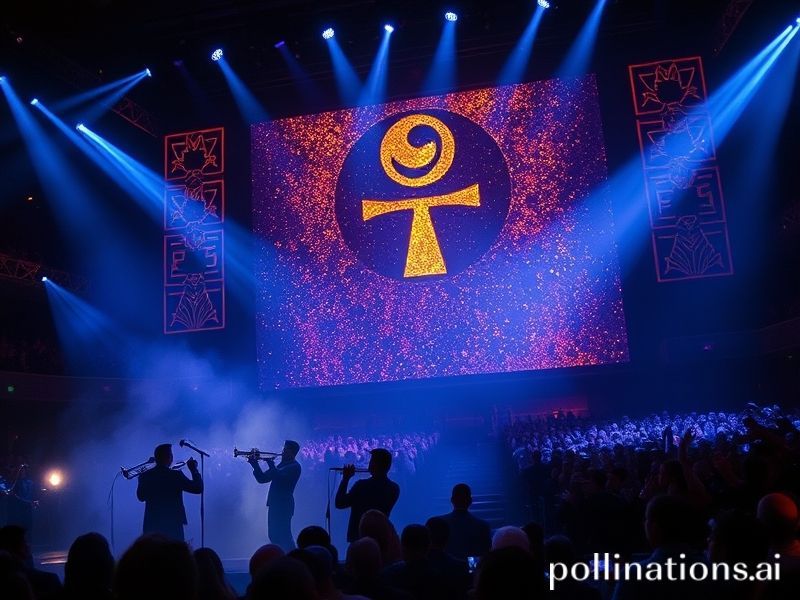Global Boogie: How Earth, Wind & Fire’s Grammy Salute Became Accidental Diplomacy in a Melting World
Grammy Salute to Earth, Wind & Fire: When Disco Diplomacy Meets the End of the World
By “Jet-Lagged” Javier Morales, Senior Correspondent, Dave’s Locker
Los Angeles—The Dolby Theatre glowed like a malfunctioning lava lamp last night while the Recording Academy attempted to resuscitate planetary morale with a “Grammy Salute to 50 Years of Earth, Wind & Fire.” Translation: a sequined séance to convince a burning globe that, yes, horns and falsettos can still keep the apocalypse on hold. Delegations from 73 countries RSVP’d; 19 heads of state sent prerecorded greetings, presumably between arms deals and climate denial. Even the Vatican dispatched a cardinal (red shoes swapped for white platform sneakers) to bless the proceedings. Nothing says “interfaith dialogue” like a 76-year-old cleric voguing to “September.”
From Lagos to Lisbon, the broadcast was simul-streamed to roughly 1.2 billion eyeballs—roughly the same number, incidentally, that the UN estimates will be climate refugees by 2050. The irony was not lost on anyone sober enough to notice. Tokyo salarymen watched on bullet-train tablets; Sudanese refugees huddled around a single solar-powered radio in Chad; and somewhere in the Arctic a Russian ice-breaker crew cranked “Boogie Wonderland” while the last of their permafrost melted into the Kara Sea. If disco is the universal solvent, last night it was dissolving borders faster than TikTok.
Musically, the night delivered. Grammy house band? Check. A horn section flown in from Cuba because, let’s face it, the embargo doesn’t apply to groove. H.E.R. shredded a wah-wah rendition of “Shining Star” that made Prince’s ghost look up from his cloud and nod approval. Lizzo arrived draped in what appeared to be recycled Grammy envelopes—recycling being the closest most attendees will ever get to environmental activism. And Stevie Wonder, still the only man alive who can harmonize with a talk-box without looking like a dentist commercial, led a finale that felt less like nostalgia than a hostage negotiation with time itself.
But the subtext read like a UN Security Council communiqué drafted on a disco ball. Every time Philip Bailey hit a high C sharp, a hedge-fund manager somewhere shorted carbon credits. Each glitter cannon blast released 1.6 kilos of microplastics—roughly the weight of a starved polar bear cub—into the Los Angeles night, promptly offset by a “green” NFT no one will remember tomorrow. Meanwhile, the price of mirror-ball futures spiked in Singapore. Yes, there is now a mirror-ball futures market; welcome to late-stage capitalism’s greatest hits.
Diplomatically, the event outperformed most G20 summits. Pakistan’s foreign minister was spotted teaching Colombia’s trade rep the Hustle; both nations later signed a memorandum on quinoa tariffs. The EU’s climate commissioner slow-danced with a TikTok influencer from Jakarta, presumably hashing out methane pledges between spins. By encore, the phrase “global unity” had been hashtagged 4.7 million times, 3.2 million by bots programmed in the same Macedonian troll farm that swung the 2016 U.S. election. Progress: it’s complicated.
Backstage, an aide whispered that the Pentagon requested the set list in advance—evidence that the U.S. military now considers funk a soft-power asset. Somewhere in a sub-basement of the Pentagon, an algorithm is plotting how many trombones equal one aircraft carrier. The answer, apparently, is 43.
As confetti settled like radioactive ash, the final message scrolled in twelve languages: “Keep Your Head to the Sky.” A noble sentiment—unless you’re on a sinking island nation, in which case the sky is the last thing you need to worry about. Still, for three commercial-free hours, Earth, Wind & Fire convinced us that rhythm might still trump rhetoric, that four-on-the-floor could outmaneuver four horsemen. It was the most optimistic lie told on American television since the last Super Bowl ad for cryptocurrency.
And maybe that’s enough. Until the oceans finish their remix of “After the Love Has Gone,” we’ll keep dancing, cynics and believers alike, because the alternative is listening to the sound of glaciers clearing their throats. So, cue the horns, lower the disco ball, and pray the next 50 years come with a better bass line.







